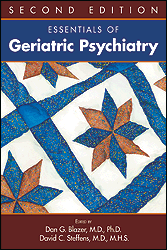|
|
|
| |
 |
|
|

|
 推薦指數:
推薦指數:





|
|
- 內容介紹
|
Essentials of Geriatric Psychiatry, Second Edition
dited by Dan G. Blazer, M.D., Ph.D., and David C. Steffens, M.D., M.H.S.
2012
436 pages
ISBN 978-1-58562-413-3
Essentials of Geriatric Psychiatry, Second Edition, distills the main concepts from The American Psychiatric Publishing Textbook of Geriatric Psychiatry, Fourth Edition, thoroughly covering not only a wide range of important mental disorders of the elderly but also the so-called normal biological, social, and behavioral effects of aging.
Essentials of Geriatric Psychiatry is organized into sections devoted to the basic science underlying geriatric psychiatry and to the evaluation, presentation, and treatment of the most common psychiatric disorders in the elderly—from mood disorders and anxiety to schizophrenia and circadian rhythm disorders. Among the additional topics considered are
•Neuropsychological assessment and its role in the diagnosis of dementia and in differentiating among various cognitive disorders.
•Specific dementia syndromes—Alzheimer’s dementia, vascular dementia, dementias due to Lewy body disease, and dementia due to frontotemporal degeneration—and their treatment.
•Approaches to assessment, diagnosis, prevention, and management of delirium, with emphasis on nonpharmacological interventions as the first line of treatment.
•New findings on bipolar disorder with onset in late life, including treatment guidelines based on case reports.
•An in-depth review of late-life bereavement, reflecting a wealth of recent research regarding intense and/or “complicated” grief.
•The physical consequences of alcoholism in later life, including interactions between alcohol use and chronic or periodic illness in elderly patients.
Chapter summaries are delivered in concise Key Point fashion, and the book’s wide array of helpful tables and charts present complex information in an easy-to-absorb form. The Second Edition of Essentials of Geriatric Psychiatry is a must-have reference for geriatric psychiatrists and psychologists and other practicing clinicians, residents in training, psychiatric nurses, social workers, and researchers.
|
|
|

